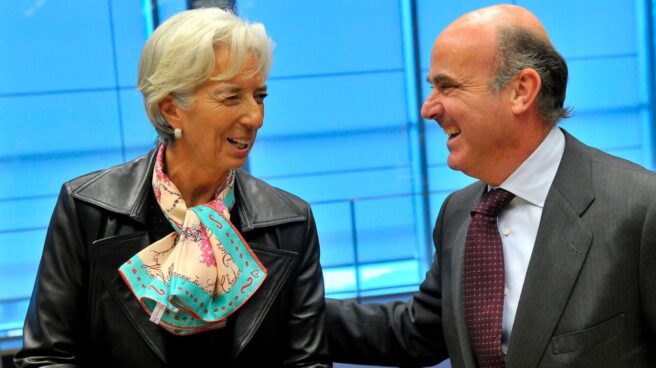

IMF Managing Director Christine Lagarde with ECB Vice President Luis de Guindos.
The European Central Bank decided to raise rates by 50 basis points, thus breaking the trend of the last two meetings, when it raised rates by 75 basis points. In this manner, The body posted the price of money at 2.5%, the highest since 2008, with the goal of bringing inflation to 2% over the medium term. Inflation ended in November at 10%, slowing growth after 17 months of growth.
Similarly, the Governing Council of the ECB indicated in its announcement that rates “they will still have to grow significantly at a sustainable pace” achieve a sufficiently restrictive level to ensure a timely return of inflation to the medium-term target of 2%. However, they note that rate hikes will be data-driven, “and they will follow a meeting-by-meeting approach.”
In a statement, the Governing Board of the organization indicated that inflation “still too high” and is expected to remain above the “too long” target. In fact, they expect inflation to be above 2% until at least 2025.
The ECB also published its macroeconomic forecasts for the coming years. In an environment of extreme uncertainty, Eurosystem staff have significantly revised their inflation forecasts upwards. They now predict that average inflation will reach 8.4% in 2022. before falling to 6.3% in 2023, with inflation expected to ease markedly over the course of the year. In addition, inflation is expected to average 3.4% in 2024 and 2.3% in 2025. As for core inflation, excluding energy and food, it will average 3.9% in 2022 and rise to 4.% in 2023 before declining to 2.8% in 2024 and 2.4% in 2025.
The eurozone economy may shrink in the current and next quarters due to the energy crisis, heightened uncertainty, weakening global economic activity and tightening financing conditions. According to the latest forecasts of Eurosystem staff, “The recession will be relatively short and shallow.” However, growth is expected to slow next year and has been revised down significantly from previous forecasts. Growth is projected to pick up in the short term as current headwinds ease. In general, according to the forecasts of Eurosystem experts, the economy will grow by 3.4% in 2022, 0.5% in 2023, 1.9% in 2024 and 1.8% in 2025.
decrease in balance
The ECB also discussed at today’s meeting the reduction of its balance sheet, that is, the principles of normalization of its debt portfolio. The agency indicated that as of early March 2023, the portfolio size of the APP (debt stimulus program) “will decline at a measured and predictable rate” by curbing reinvestment maturities. The reduction will average 15,000 million euros per month until the end of the second quarter of 2023, after which its continuity will be reviewed.
At its February meeting, the Governing Council will announce the detailed parameters for the reduction of APP assets, and then “will periodically review the rate of reduction of the APP portfolio” to ensure that it remains in line with the overall monetary policy stance and strategy, and to maintain market stability.
Source: El Independiente